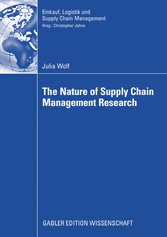Search and Find
Service
More of the content

The Nature of Supply Chain Management Research - Insights from a Content Analysis of International Supply Chain Management Literature from 1990 to 2006
3 Research Methodology (S. 38-39)
An important decision in every research is the selection of the appropriate research methodology for the investigation of the posed research questions. In order to facilitate the selection process, Yin (1994) proposed a selection process that classifies appropriate research approaches in terms of the questions that should be answered, the required control of behavioural events and the necessary focus on contemporary events (Yin, 2003, p. 5).
In terms of the type of research questions, he differentiates five basic questions: "who", "what", "where", "how", and "why" questions. A look at the research questions identified in the previous chapter reveals that most of the questions are "what" and "how" questions. "What" questions can be further divided into exploratory and descriptive "what" questions. In this research the former type of research question dominates which justifies an exploratory methodology (Yin, 2003, pp. 5-6). "How" questions tend to be explanatory in nature and require the application of research methodologies that are able to deal with links that can be traced over time such as case studies, historical analyses, archival analyses and experiments.
Case studies and experiments tend to focus on contemporary events and require a high degree of control over behavioural events. As a major interest of this research is to understand the development of SCM research over time, case studies and experiments are of minor relevance as these methodologies have only limited capacity to track historical events in an international scientific community. Therefore, historical and archival analyses remain the most appropriate research methodologies for this thesis.
As historical analyses are less capable of providing answers to "what" questions, an archival analysis is chosen as an appropriate research methodology for this research. Since this project is essentially focused on the scientific developments of SCM as a research field, a major source of knowledge are published research outcomes such as books, articles, conference contributions and so on. Therefore, the following specific types of archival research seem to be of particular interest for this study: Systematic literature review (e.g. Denyer & Tranfield, 2006, Hart, 2005, Tranfield, Denyer & Smart, 2003, Tranfield & Starkey, 1998), citation, co-citation analyses and bibliometrics (e.g. Braam, Moed & van Raan, 1991a, 1991b, Glenisson, Glänzel, Janssens & De Moor, 2005, Shapiro, 1992), and content analysis (e.g. Duriau, Reger & Pfarrer, 2007, Kassarjian, 1977, Kolbe & Burnett, 1991, Krippendorff, 2004).
Citation analysis is based on direct counts of references made to or received from other documents, whereas paired citations are used as measure of association between documents in co-citation analysis (Eom, 2003, p. 8). Citation and co-citation analyses would therefore, be able to understand underlying patterns of SCM research, for example, schools of thought, but the majority of the other research questions such as the methodologies applied and the object of study could not be covered with these methodologies. Therefore, citation analysis, co citation analysis and other bibliometric methodologies are not used for this research.
All prices incl. VAT












